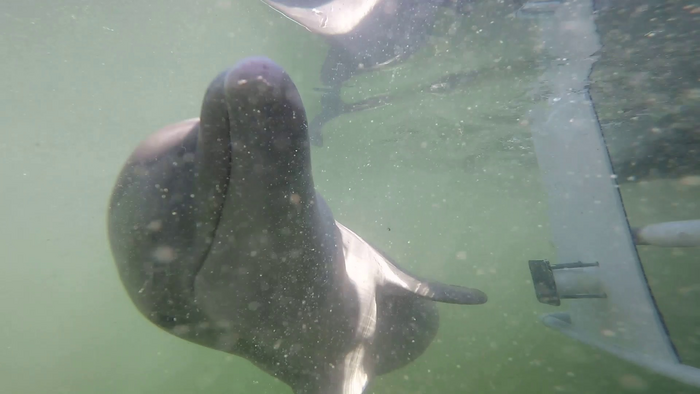Dolphins are social, intelligent animals who rely on whistles and echolocation to hunt and reproduce. This means that noise generated from human activity such as drilling and shipping has the potential to negatively impact the health of wild dolphin populations. A study in the journal Current Biology published on January 12 demonstrates that dolphins “shout” when trying to work together in response to increasing underwater noise levels.

Credit: Current Biology/Sorensen et al.
Dolphins are social, intelligent animals who rely on whistles and echolocation to hunt and reproduce. This means that noise generated from human activity such as drilling and shipping has the potential to negatively impact the health of wild dolphin populations. A study in the journal Current Biology published on January 12 demonstrates that dolphins “shout” when trying to work together in response to increasing underwater noise levels.
“Those same reasons that make sound so advantageous for animals to use also make them susceptible to disturbance from noise in the environment,” says first author Pernille Sørensen (@PernilleMS) of the University of Bristol, Bristol, UK. “Within the last couple of decades, we’ve seen a dramatic increase in human-made noise, and noise pollution in the oceans is no exception.”
The two dolphins observed in the study, Delta and Reese, were placed in an experimental lagoon and equipped with suction-cup sound recorders to document their vocalizations. The dolphins had to work together to both press their own underwater button placed at either end of the lagoon within one second of each other. They were released from a starting point during each trial, and for certain trials, one of the dolphins was held back for five to ten seconds while the other was released immediately. In the delayed-release trials, the dolphins had to rely solely on vocal communication to coordinate the button press.
The researchers found that when increasing levels of noise were played from an underwater speaker, both dolphins compensated by changing the volume and length of their calls to coordinate the button press. From the lowest to highest levels of noise, the dolphins’ success rate dropped from 85% to 62.5%.
Not only did the dolphins change their calls, but they also changed their body language. As noise levels increased, the dolphins were more likely to re-orient themselves to face each other, and they were also more likely to swim to the other side of the lagoon to be closer.
“This shows us that despite them using these compensatory mechanisms, their communication was impaired by noise,” says Sørensen. “Our work shows that despite their attempts to compensate, despite being highly motivated and the fact that they know this cooperative task so well, the noise still impaired their ability to successfully coordinate.”
While this research was conducted with dolphins living in human care, human-generated noise can potentially have detrimental effects on wild dolphins, too. “If groups of animals in the wild are, for example, less efficient at foraging cooperatively, then this will negatively impact individual health, which ultimately impacts population health,” says co-author Stephanie King (@_StephanieLKing), associate professor at the University of Bristol, Bristol, UK.
“Our work shows that these adjustments are not necessarily enough to overcome the negative effects of noise on communication between individuals,” says King. Since dolphins rely on their communication skills to successfully hunt and reproduce, noise levels can affect their behaviors, which in turn affect population health.
“This collaboration with international colleagues at the Dolphin Research Center provided us with a unique opportunity to investigate the impact of noise on animals working together in a controlled setting, something that is almost impossible to do in the wild,” says Sørensen. To study this in the wild, the researchers would need further understanding of when animals are actively working together and how cooperative behavior is coordinated.
“Our results clearly show the need to account for how noise affects group tasks in wild animals” adds Sørensen.
###
Current Biology, Sørensen et al.: “Anthropogenic noise impairs cooperation in bottlenose dolphins” https://www.cell.com/current-biology/fulltext/S0960-9822(22)02000-0
Current Biology (@CurrentBiology), published by Cell Press, is a bimonthly journal that features papers across all areas of biology. Current Biology strives to foster communication across fields of biology, both by publishing important findings of general interest and through highly accessible front matter for non-specialists. Visit http://www.cell.com/current-biology. To receive Cell Press media alerts, contact [email protected].
Journal
Current Biology
DOI
10.1016/j.cub.2022.12.063
Method of Research
Experimental study
Subject of Research
Animals
Article Title
Anthropogenic noise impairs cooperation in bottlenose dolphins
Article Publication Date
12-Jan-2023




